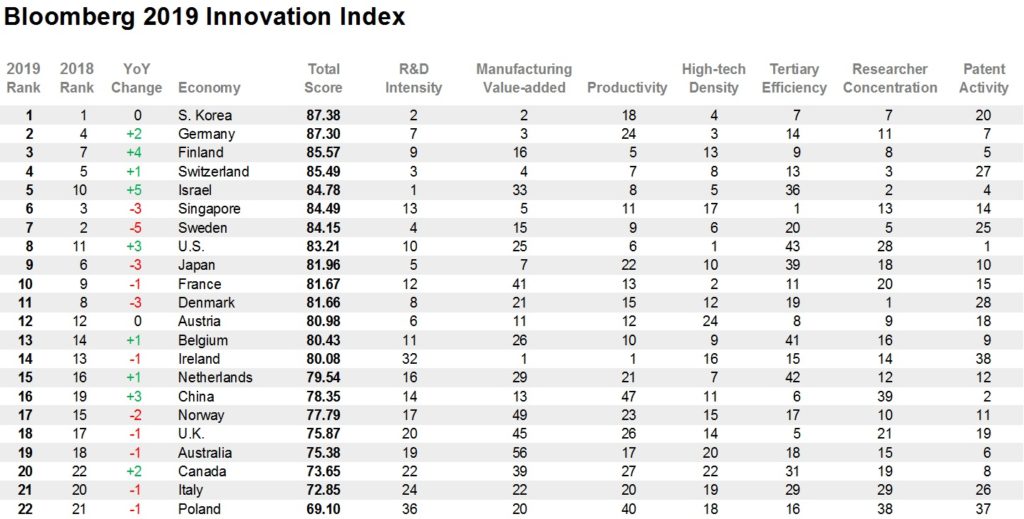Israel surged to 5th place in the newest Bloomberg Innovation Index of 2019, climbing five spots from last year’s index where Israel ranked 10th for the second consecutive year.
The country retained its top spot in the R&D intensity category of the survey and dropped to second place (from first last year) in research concentration.
In 5th place in the overall survey, Israel overtook Sweden, which was 2nd in 2018, Singapore, 3rd last year, and Japan, which came in 6th in last year’s index. South Korea retained the global crown in the innovation index and the US climbed its way back to the 8th spot after falling out of the top 10 for the first time last year.
Israel was the only country to beat South Korea in the R&D intensity category, that is the R&D expenditure as a percentage of GDP. This year’s top spot in research concentration (professionals engaged in R&D per population) went to Denmark.
Israel’s biggest jump was in patent activity, from the 19th spot last year, to 4th in the latest index, signaling significantly more patent filings. The country retained its 5th spot in high-tech density (the number of locally domiciled high-tech companies) for a second year. It also improved its tertiary education efficiency ranking, which measures the share of new science and engineering graduates in the labor force and those enrolled in post-secondary education program, from 41st last year to 36th this year.
Meanwhile, in the World Economic Forum’s Global Competitiveness Report for 2018-2019, published in October, Israel came in 20th out of 140 countries, dropping four places from 2017-2018’s 16th spot, but retaining top marks for a number of categories including innovation, spending on R&D, and positive attitude toward entrepreneurial risk.
The annual index, published first in 2004, ranks countries’ competitiveness based on 12 categories (or pillars), including innovation capability, technological readiness, business dynamism and higher education, and 98 indicators (subcategories).
The latest WEF index introduced changes to the way countries are assessed according to the Fourth Industrial Revolution (4IR), including the addition of subcategories, new benchmarks, and “weighting pillars equally rather than according to a country’s current stage of development.”
In the WEF survey, Israel ranked 16th in the “innovation capability” pillar, and its highest ranking in a category was 5th in “business dynamism which looks at the administrative requirements of starting a business as well as entrepreneurial culture. But Israel was the top performer in the “growth of innovative companies” and “attitudes toward entrepreneurial risk” sub-categories of business dynamism, also coming in 1st in R&D expenditures as a percentage of GDP under the “innovation capability” pillar.
Israel also ranked 2nd out of 140 countries in “venture capital availability” and “ease of finding skilled employees” due to its highly educated workforce. The country also ranked 3rd worldwide with “companies embracing disruptive ideas” and “multi-stakeholder collaboration.”
“Israel spends the most of any country in the index on R&D (4.3 percent of GDP), and is where entrepreneurial failure is most accepted and innovative companies grow the fastest…A well-developed financial sector (22nd), with the second-best availability of venture capital in the world, also supports a flourishing and innovative private sector,” the WEF report read.
In the WEF’s Global Competitiveness Report for 2018-2019, the United States was ranked the most competitive country in the world, according to the index, placing first in the overall ranking as well as in business dynamism,

Credit: nocamels.com



